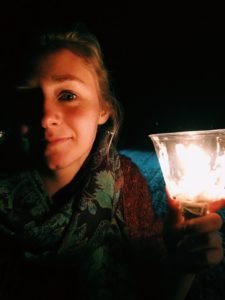
Amelie between songs at the vigil outside of the Eloy Detention center.
On November 15, 2018, I stood in a throng of people outside of the deadliest detention center in the United States. The bright headlights of police cars illuminated us and made the sea of darkness between our feet on the sidewalk and the guarded detention center seem to stretch even further. I trembled, partly from the night’s cold, partly from the sheer energy pulsing through the crowd. Drums beat and our throats were sore with shouts of “Abre la frontera!” or “No estan solos! You are not alone!” From the windows of Eloy Detention Center, detained migrants waved cloth articles or flicked their lights on and off to let us know they could hear us.
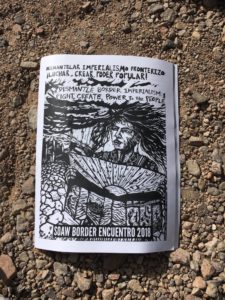
SOAW’s Border Encuentro booklet for 2018, with the cover designs from Justseeds.
At my elbows, I felt the warmth of the volunteers and young women I’d been living with for three months at that point. And somewhere in the crowd, I knew, some of the co-members and Sisters of Loretto were linked with each other, shouting and singing too. I felt it like a glowing thread of energy. Our small community was scattered and present and merging with the larger community of humans who showed up that night.
This rally before Eloy Detention Center was the kick-off of a four-day protest and teach-in called the SOA Watch Border Encuentro. For some context, the Border Encuentro is an annual teach-in/protest. Its goal is to raise awareness and demand an end to the militarization of the border and the U.S.’s imperialistic tactics. It was sparked by the creation and practice of the SOA (School of Americas), now renamed WHINSEC (Western Hemisphere Institute for Security Cooperation), which is a US Departments of Defense-sponsored and run school. The SOA has a history of training military officers mostly from Latin America – individuals and groups who have gone on to terrorize and commit war crimes against civilians in Central and Latin America. The dates of the annual Encuentro coincide with the murders of 6 Jesuit priests, their housekeeper and housekeeper’s daughter, in El Salvador, November 1989, bringing attention to the fact that the majority of the 27 murderers were students of the School of Americas.
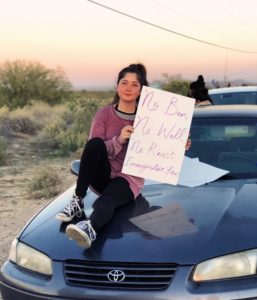
Amy, an El Paso Loretto Volunteer, taking a turn holding a Loretto banner at a morning gathering alongside the Nogales, Arizona/Sonora, Mexico border wall.
After that first night of the Encuentro, the following days were filled with morning rallies and messages of hope and calls to action, followed by workshops, the sharing of powerful, emotional testimonies, and music. In this time, I listened and absorbed as much new information and stories as I could. It was a busy few days. One where I ran into our Sisters and co-members only here and there, and one where the 8 of us volunteers would often split into pairs because there were so many different workshops happening at once.
As such, there was plenty to reflect on. There were multiple times throughout the weekend when I thought about my own presence at the protest. I thought about the privilege that enables a person to be able to road trip over a weekend, protest and take in new information, and then just go back home. I thought about people I’ve known in my own life who are activists in the streets but don’t touch the same issues in their daily life or relationships – another privilege when the issue doesn’t affect your daily life and you can leave it at the front door with your shoes. I thought about having been there, and how to be different. I thought about the need to amplify the voices of people of color at grassroots-organized events such as this one (but also everywhere), and the need for white people to be quiet and listen. And most repetitiously, I thought about the testimonies of the men and women who shared their heartbreaking, too real, and too common stories of immigrating to the US and their welcome here (or extreme lack thereof). I felt their pain – though only a fraction of it since I’ll never experience what they have. And I thought about hopelessness. Exhaustion. The kind that comes with extreme loss and injustice, like those who shared their stories over the mic at the protest.
And then I began thinking about why I was there… with whom I was there with. Maybe this was sparked by the hugs and check-in’s Sister Mary Margaret sprinkled on us throughout. Maybe it was us volunteers taking turns passing around the Loretto banner that said, “Sometimes to remain silent is to lie.”
But nevertheless, I started thinking about the Sisters of Loretto and the way they do service. I knew, for example, that when Sister Mary Margaret went home after this retreat, she would continue to make sack lunches or dinners for migrants at one of the temporary transitional shelters for migrants in El Paso. I thought of how she’d continue to visit a man whose been detained by ICE for nearly a year, and how she’d continue to support his visiting wife in what ways she could. I thought about how she’d keep on supporting and being a presence at one of the women’s homeless shelter whose founding she’d supported. And not because of some toxic savior complex, but because she believes it is her responsibility to other humans to keep showing up and doing the work. I also thought of other sisters of Loretto. Those who showed up for marches, some even having marched with Dr. Martin Luther King Jr.. And those who then went home and rallied against injustice in their daily lives, providing greater opportunities for girls; starting schools for people considered dangerous when educated, such as Black people, and Native folks; speaking out and acting against global nuclearization.
From serving with sisters, I’ve learned about the value of simply showing up – being present, listening, using your own voice when necessary, amplifying the voices of historically and systemically silenced folks, and further raising awareness of issues. And I’ve learned about the value of the “behind-the-scenes” work that often goes unnoticed but is completely necessary and driving in any type of change.
I also thought of conversations I’ve had with different sisters – ones where they admitted that along with all the good they strove for throughout their lives, they undoubtedly caused harm to the same people they were trying to serve at various points – paying mind to their own whiteness and/or problematic tendencies and their mistakes, and to the simple fact that we all have learning and growing to do, always. I’ve witnessed Sisters get called out on something harmful they said or did without knowing it. And I’ve witnessed some handle this graciously and others poorly, and then how the community responds with determination and love.
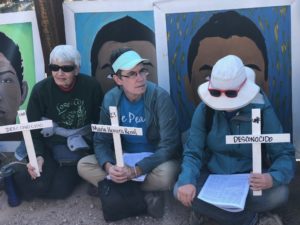
During a ceremony remembering those who have died as a result of the militarization of the U.S. border wall, Sister Mary Margaret (left) and Loretto co-member Susan (middle) hold space for them.
From not only serving with sisters, but being in community with them, I’ve also learned that community is not always pretty, and it is never perfect. But it is strong. And because of its strength, it can allow us to grow and question and challenge each other, without the knot loosening and falling apart. Through this strength and resulting ability to continue to grow and change and become better, we are better able to serve others in what ways they need most.
Serving and being in community with sisters has meant more to me than I previously thought possible. It has instilled in me a greater appreciation for showing up, doing the big “little” work, and for the beautiful and the ugly parts of community. Essentially, serving with sisters gives you a glimpse of what hope and action and growth can look like throughout one’s lifetime. I realized I’d seen it often in my 3 months as a Loretto Volunteer, but at the Encuentro, I could finally name it as I watched our Sisters of Loretto in the crowd. I saw their white heads bobbing, arms linked, voices warmed up, with every intention of supporting and lifting up people of marginalized identities – listening, learning, and coupling that with action when they’re back alongside those they link arms with every day.
Be sure to follow CVN’s Blog on Thursdays to hear more from Amelie and her fellow Serving with Sisters Contributors!
 Amelie Rode is a volunteer with the Loretto Volunteer Program and a CVN Serving with Sisters Contributor. This blog series is sponsored by our VOCARE Initiative, thanks to the support of the Conrad N. Hilton Foundation.
Amelie Rode is a volunteer with the Loretto Volunteer Program and a CVN Serving with Sisters Contributor. This blog series is sponsored by our VOCARE Initiative, thanks to the support of the Conrad N. Hilton Foundation.

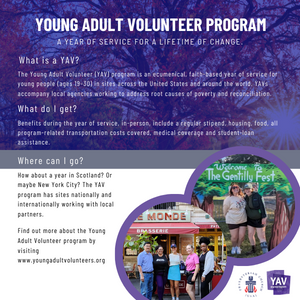
 Thousands of faith-based service opportunities can be at your fingertips with the RESPONSE. Download the latest edition today!
Thousands of faith-based service opportunities can be at your fingertips with the RESPONSE. Download the latest edition today!
